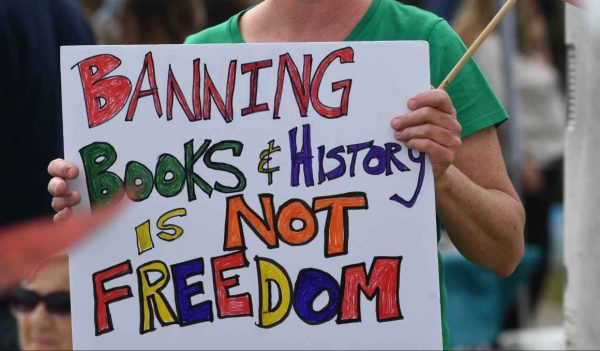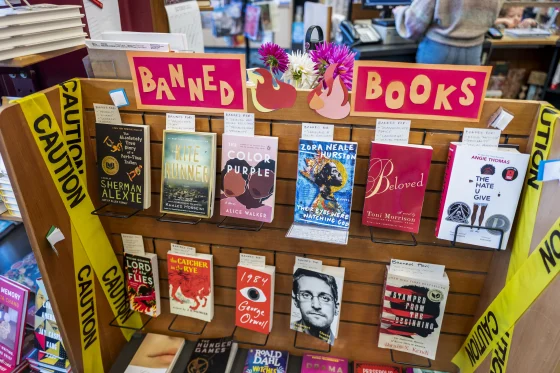Censorship. A crime that has plagued humanity for thousands of years. It’s not just an attack on free speech, it’s an attack on progress. From the conviction of Socrates in 399 BC, who was sentenced to death for allegedly corrupting the youth of Athens, to the book burning perpetrated in the 1930’s by the Nazi Germany, intellectualism and knowledge has been suppressed for millenia. And in this country, a nation built on ideas of life, liberty, and the pursuit of happiness, censorship should be shunned. Yet, as the years pass and parents across the nation demand that certain books be removed from high school libraries, we regress into anti-intellectualism, fear, and inequality.
In modern times, literature seems to be the main focus of people’s wrath. In November 2024, the Florida Department of Education removed over 700 books from its schools, including well-known and influential titles such as Slaughterhouse-Five by Kurt Vonnegut and 1984 by George Orwell. The irony of 1984, a novel about government control, censorship, and erasing the truth, being banned by a government claiming to be doing this for the “benefit” of the people is absurd and deeply unsettling. It feels like we’re living in the various dystopias these authors described. Only now, it’s real.
Of course, the argument that giving children age-appropriate literature to ensure their safety is reasonable. Nobody is suggesting giving young children access to graphic or violent materials after all. But there’s a difference between protecting children and sheltering them. Yet, using that as a primary reason to remove literature with challenging or uncomfortable themes is a dangerous route, one that sets the precedent for removing anything that violates the status quo. Take the cases of topic restrictions, for example, like those done with Governor DeSantis’ “Stop WOKE Act,” which restricted discussions on race, gender, and systemic oppression in an educational setting. It’s no longer about protecting students, it’s about controlling what they’re allowed to think and who they’re allowed to become.
Censorship isn’t restricted to Florida or traditionally “red” states, as our small town of Ludlow has faced some challenges, as seen with the book “Crank” by Ellen Hopkins, which was challenged in 2022 due to its discussion of the horrors associated with Meth addiction. Understandably, parents may fear the effect that these novels may have on their children; however, is it the best choice to shield them from reality?
Even our librarian, Ms. Hedin, is worried about making a parent upset, “It’s definitely made me nervous and made me think twice about, if I buy this, is it going to upset somebody, whether or not the book belongs in the library on its own merit.” The fact that she has to ask herself that question at all says something deeply troubling.
If librarians, people who are supposed to provide students with vast amounts of uncensored media, have to worry about a potential backlash from parents or government officials trying to “protect” the minds of their children, then can we really call ourselves a “free” country?
Educators across the nation ask this very question. Yet, in our school, our beloved AP Language teacher, Mr. Cangemi, has a different thought: “I am seeing more ‘self-censorship’ than any type of censorship from administrators or parents.” Even books that he believes should be taught are not, “because teachers do not want to deal with the ramifications.” That fear of potential punishment is nearly as dangerous as actual book banning.
A fair assessment, considering the case of Katherine Rinderle, a 5th-grade teacher at Due-West Elementary School in Marietta, Georgia, who was fired for reading the book “My Shadow is Purple” by Scott Stuart to her class, which discusses gender identity in a comfortable and age-appropriate manner. Teachers across the nation are being oppressed and silenced by individuals who believe that learning about this will corrupt their children instead of allowing them to flourish and grow to be more accepting. How are students supposed to become critical thinkers if we hide topics that might be a little uncomfortable?
And let’s face it: no matter how much people complain or protest, books with “sensitive” topics will still be read. Whether online, through friends, or in college, students will find ways to access the information they’re being denied.
When asking a college freshman at the University of New Haven and alumni of Ludlow High School, Elizabeth Richter, about her opinion on whether controversial or potentially “dangerous” titles belong in public or high school libraries, she stated, “I do believe that controversial titles belong in libraries as most of them provide knowledge on different topics.” She goes on to discuss that, “Most of the books that are considered controversial need to be read because they teach people about the world and can show how different ways of control or different worlds connect to our world.” Her statements reflect what many students of higher education believe: controversial books often teach us the most.
So, if there’s an educational necessity to some of these controversial titles, then why go out of your way to restrict education?
The answer, in a word, is fear. Fear of what they don’t understand; fear of change.
That fear, while understandable, is self-defeating. Change is never and never will be easy. It’s often completely unpredictable and extremely uncomfortable. Yet, the grand scheme of things, change is inevitable. You can’t escape it, although many have tried. A world without change is a world without a future; it’s a future built on silence, fear, and control. That is a future we must never accept.



Carina Fonseca • Jun 2, 2025 at 1:36 pm
Very well written!